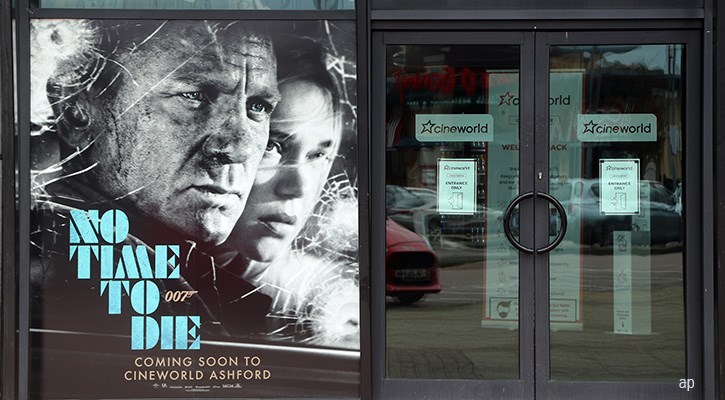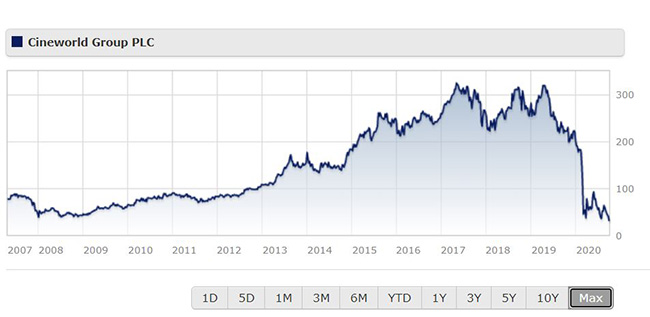
Disruption to normal life this year has been profound in certain industries, such as hospitality and retail. The sharp economic shock brought by the Covid-19 pandemic has led to a collapse in share prices in many companies.
Earlier this year we looked at how consumer trends are likely to have been changed by the pandemic. Now, with cases rising again in Europe – and the UK reintroducing regional lockdowns – a return to “normality” still looks a long way off.
We look at three companies whose shares had soared before the coronavirus crisis but have slumped since as their business models have been upended in the world of remote working and social distancing.
Cineworld (CINE)
UK cinemas were some of the last businesses to have UK Government restrictions lifted and Cineworld, the second-largest cinema operator in the world with 9,500 screens, re-opened on July 31. But the company said in early October that it would shut its UK and US screens, blaming ongoing coronavirus restrictions and delays to blockbuster films such as the new James Bond movie No Time to Die. Rival operator Vue has followed suit, closing a quarter of its cinemas for three days a week. In a sign of the times, Disney Pixar’s latest film Soul, which was set to be released in cinemas in November, will now go straight to Disney’s streaming service at Christmas.
Cineworld’s shares started the year at 220p and are now at 28p, a fall of 87%. The company’s shares floated at 170p in 2007 and topped 300p just last year. Even before October’s shutdown, Cineworld was among the most shorted stocks on the UK market. Among Morningstar-rated funds, Cineworld is owned by Neutral-rated Schroder UK Alpha Plus and Silver-rated Henderson Smaller Companies Trust (HSL).
Harry Barnick, senior analyst at research firm Third Bridge says the tumult in the cinema industry could attract streaming leaders like Netflix and Amazon into the movie business. Despite the growth in digital films and restrictions on cinema goers, film-makers are still attracted by the prestige and financial gain offered by cinema screenings. AJ Bell’s investment director Russ Mould says Cineworld went into the pandemic in a weak financial position and dependent on smash-hit films like the Bond franchise and superhero films.

Hotel Chocolat (HOTC)
Aim-listed Hotel Chocolat’s outlets have proliferated in recent years across UK towns and cities, with a particular focus on commuter hotspots like train stations.
But shops make up 70% of the firm's sales and with the many City-based office workers now remote working, the company’s concessions have been affected by the dramatic drop in retail footfall.
That change pushed the retailer into a loss after tax of £6.5 million in the year to the end of June, compared to a £10 million profit the previous year. It didn’t help that lockdown hit just before the key Easter trading period, but the company has ramped up investment into its e-commerce operations and said it has seen a big jump in online traffic as stuck-at-home workers seek out sweet treats. The company has also tapped into the “premiumisation” trend backed by fund manager Nick Train, whereby shoppers are happy to pay more for a product such as chocolate if it’s higher quality or seen to be more sustainable.
Hotel Chocolat floated in 2016 at 148p and shares peaked at almost 500p in early January, an increase of 235%. But the shares slumped to March 18 at 217p, though they have since recovered above 300p. Hotel Chocolat is owned by a number of smaller companies funds and makes up nearly 3% of the four-star rated Aegon UK Opportunities Fund and around 1.5% of the Bronze-rated Franklin UK Smaller Companies Fund. It’s also held by ESG-focused Ninety One UK Sustainable Equity Fund, which has a Morningstar Quantitative Rating of Neutral.
WH Smith (SMWH)
WH Smith is another company whose business model has been turned upside down in 2020, as its lucrative airport and train concessions have been badly affected by the slump in international travel and day-to-day commuting.
The last 10 years have seen a big increase in the retailer’s share price as the 228-year old company expanded into more than 30 countries. The boom in budget airlines and increase in rail commuter numbers have all been tailwinds for WH Smith in the last decade, after it switched its focus from the high street to outlets in airports and stations.
Shares were around 500p in 2010 and hit an all-time high of 2654p in December 2019, an increase of 430%. The company’s ability to provide reliable, rising dividends in that period also attracted income managers.
But shares have crashed this year to 1,000p amid the travel slump and it scrapped its interim dividend. In its August trading update, it said the recovery in the travel division was slow going as workers began returning to offices and holidaymakers started using its airport concessions again. But the latest lockdown measures pose a threat to this recovery, and investors will get a clearer picture of trends when full-year results are released in November.
WH Smith is held by a number of Royal London funds, including the Silver-rated Royal London UK Equity Income fund and the Royal London UK Dividend Growth, which has a Morningstar Quantitaive Rating of Gold. Other fund houses with holdings include Aberdeen Standard, Merian and Artemis.








.jpg)



















